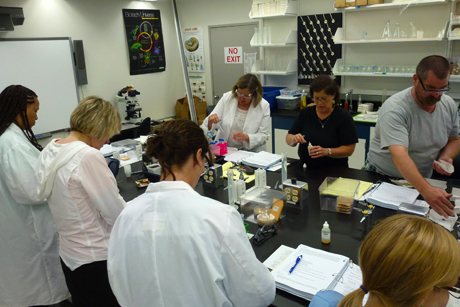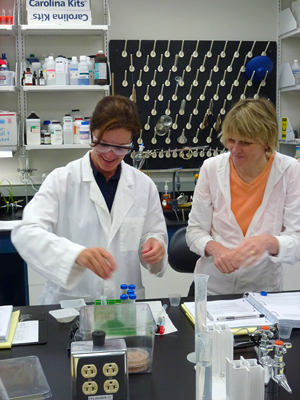Teachers tackle bioenergy in weeklong course on campus
By Fiona Rice

An interdisciplinary team of 10 high school teacher fellows from across the northeastern United States are at the Boyce Thompson Institute for Plant Research (BTI) and Cornell this week (July 15-19) for the Bioenergy and Bioproducts Education Program (BBEP) Master Teacher Program.
Through workshops, lectures, activities and tours, the teachers are focusing on bioenergy and bioproducts systems in use and development. The participants, who are fully funded by the U.S. Department of Agriculture, work with BTI and Cornell staff and scientists on campus.

Led by Corinne Rutzke, senior research associate at Cornell, and Tiffany Fleming of BTI, the program highlights a different topic each day, providing a framework for a comprehensive sustainability and renewable energy education. Highlights of the program include a tour of Cornell Compost, a “mining for chocolate” laboratory activity, and a seminar presented by Graham Pugh, the U.S. Department of Energy’s director of International Climate Change Policy and Technology, who will discuss the role that scientists play in clean energy policy development.
After the teachers complete the program, they are provided with follow-up support and materials by program staff to help them implement bioenergy and bioproduct concepts in the classroom.
“What is really unique and stimulating about this program is that it is entirely interdisciplinary,” says Fleming, “teachers of biology, environmental science and chemistry are coming together with cooperative extension educators, policy analysts, landowners, community members and students to examine the benefits and challenges posed by a growth in bioenergy, bioproducts and the emerging ‘bioeconomy.’”
The teachers learn how society could use plants and other forms of biomass to meet the nation’s growing energy demands, sustainably, and with fewer negative environmental impacts, and “how to creatively and effectively bring this conversation into schools and society,” she adds.
The program, in its third year, is a nationwide collaboration among BTI, Cornell, Delaware State University, Ohio Bioproducts Innovation Center, Cornell Cooperative Extension, Pennsylvania State University, the University of Maryland at Eastern Shore and West Virginia University.
Fiona Rice is the communications and development coordinator at BTI.
Media Contact
Get Cornell news delivered right to your inbox.
Subscribe